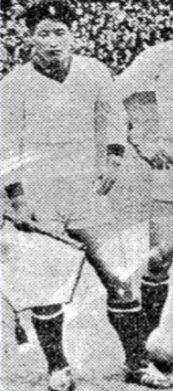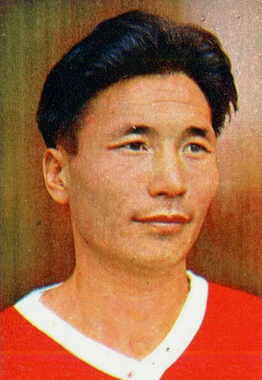Related Research Articles

The 1966 FIFA World Cup was the eighth FIFA World Cup, a quadrennial football tournament for men's senior national teams. It was played in England from 11 to 30 July 1966. England defeated West Germany 4–2 in the final to win their first ever World Cup title. The final was level at 2–2 after 90 minutes and went to extra time, when Geoff Hurst scored two goals to complete his hat-trick, the first to be scored in a men's World Cup final. England were the fifth nation to win the event, and the third host nation to win after Uruguay in 1930 and Italy in 1934. Two time reigning champions Brazil failed to get past the group stages as they were defeated by Hungary and Portugal. It was the first time that defending champions were eliminated in the group stages after Italy in 1950. This would not occur again until 36 years later. It was opened by Queen Elizabeth II during the opening ceremony.

The South Korea national football team represents South Korea in men's international football and is governed by the Korea Football Association. South Korea has emerged as a major football power in Asia since the 1980s, having participated in ten consecutive and eleven overall FIFA World Cup tournaments, the most for any Asian country. Despite initially going through five World Cup tournaments without winning a match, South Korea became the first Asian team to reach the semi-finals when they co-hosted the 2002 tournament with Japan. South Korea also won two AFC Asian Cup titles, and finished as runners-up on four occasions. Furthermore, the team won three gold medals and three silver medals at the senior Asian Games.

The North Korea national football team represents North Korea in men's international football and it is controlled by the DPR Korea Football Association, the governing body for Football in North Korea. The team represents both FIFA and Asian Football Confederation (AFC).

The Olympic Stadium is a multi-purpose stadium in Phnom Penh, Cambodia. It has a capacity of 50,000. Despite its name, the stadium has never hosted an Olympic Games.
The 1966 FIFA World Cup qualification was a series of tournaments organised by the five FIFA confederations. The 1966 FIFA World Cup featured 16 teams with one place reserved for the host nation, England, and one reserved for defending champions Brazil. The remaining 14 places were determined by a qualification process in which the other 72 entered teams, from the five FIFA confederations, competed. UEFA, CONCACAF and CONMEBOL qualification was determined within the confederations, whilst AFC and CAF teams competed for one place at the tournament.
The AFC U-20 Asian Cup, formerly known as the AFC Youth Championship and AFC U-19 Championship, is a biennial international association football competition organised by the Asian Football Confederation (AFC) for the men's under-20 national teams of Asia that also serves as a qualification tournament for the FIFA U-20 World Cup. The competition has been held since 1959. Between 1959 and 1978, the tournament was held annually ; since 1980, it has been held every two years. The 1980 AFC Youth Championship had a qualification stage for first time.
Below are the squads for the 1966 FIFA World Cup final tournament in England. Spain (3), West Germany (3) and France (2) had players representing foreign clubs.
Pak Doo-ik is a North Korean former footballer who played as a forward. He scored the goal which knocked out Italy from the group stage of the 1966 FIFA World Cup.
Group G of the 2010 FIFA World Cup began on 15 June and ended on 25 June 2010. The group consisted of reigning Copa América champions Brazil, North Korea, the Ivory Coast and Portugal.
North Korea qualified and participated in the 1966 and 2010 FIFA World Cup.
Association football in North Korea is governed by the DPR Korea Football Association (KFA), which was established in 1945. While football is the most popular sport in the country, the state's secrecy makes it difficult to accurately determine things such as attendances and popularity for club matches.
21 teams entered the 1966 FIFA World Cup qualification rounds for the African, Asian, and Oceanian zone.
Li Chan-myung is a North Korean former football goalkeeper who played for North Korea in the 1966 FIFA World Cup. He also played for Kigwancha Sports Club, which is based in Sinuiju.
Pak Li-sup is a North Korean football defender who played for North Korea in the 1966 FIFA World Cup. He also played for Amrokgang Sports Team.

Shin Yung-kyoo was a North Korean football defender who played for North Korea in the 1966 FIFA World Cup. He also played for Moranbong Sports Team.
Li Keun-hak, also known as Lee Keun-hak or Li Gun-hak was a North Korean football goalkeeper. He recorded over 50 appearances for the national team and was part of their squad at the 1966 FIFA World Cup. He also played for Moranbong Sports Club.
Kim Seung-il is a North Korean football forward who played for North Korea in the 1966 FIFA World Cup. He also played for Moranbong Sports Team.

Oh Yoon-kyung was a North Korean football defender and midfielder who played for the national team in the 1966 FIFA World Cup. He also played for the 8 August Sports Club.

Kim Bong-hwan was a North Korean football forward who played for national team in the 1966 FIFA World Cup. He also played for Kikwancha Pyongyang.

North Korea-United Kingdom Relations are the bilateral relations between North Korea and the United Kingdom.
References
- ↑ Copa do Mundo da FIFA Inglaterra 1966 Archived 2012-03-23 at the Wayback Machine
